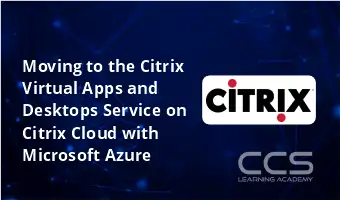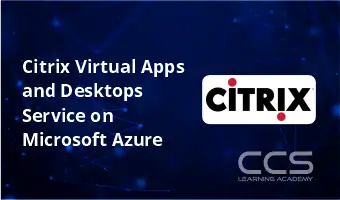Filter by Topic
Filter by Vendor
Moving to the Citrix Virtual Apps and Desktops Service on Citrix Cloud with Amazon Web Services
Navigate the move from an on-premises environment into Citrix Cloud …
What you'll learn
Understand the differences between Citrix Virtual Apps and Desktops on-premises and the Citrix Virtual Apps and Desktops Service
Deploy and manage Virtual Delivery Agent machines in AWS using Machine Creation Services
Integrate Citrix Cloud and Citrix Virtual Apps and Desktops with AWS Active Directory Service
Design Machine Catalogs and virtual machines on AWS
Provide remote access with Citrix Workspace, Citrix StoreFront, and Citrix Gateway on AWS
Citrix Virtual Apps and Desktops Service on Amazon Web Services
Course Description: Learn to plan, create, maintain, and support your …
What you'll learn
Prepare the AWS environment for secure integration with Citrix Virtual Apps and Desktops Service
Deploy and manage Virtual Delivery Agent machines in AWS using Machine Creation Services
Integrate Citrix Cloud and Citrix Virtual Apps and Desktops with AWS Active Directory Service
Design Machine Catalogs and virtual machines on AWS
Provide remote access with Citrix Workspace, Citrix StoreFront, and Citrix Gateway on AWS
Moving to the Citrix Virtual Apps and Desktops Service on Citrix Cloud with Microsoft Azure
Course Description: Navigate the move from an on-premises environment into …
What you'll learn
• Understand the differences between Citrix Virtual Apps and Desktops on-premises and the Citrix Virtual Apps and Desktops Service
• How to install, configure, and manage Citrix Cloud Connectors
• Deploy and manage Virtual Delivery Agent machines to on-premises resource locations as well as in Microsoft Azure using MCS
• Integrate Citrix Cloud and Citrix Virtual Apps and Desktops with Microsoft Azure Active Directory
Citrix Virtual Apps and Desktops Service on Microsoft Azure
Course Description: Learn to deploy and manage your Citrix Virtual …
What you'll learn
• Prepare the Azure environment for secure integration with Citrix Virtual Apps and Desktops
• Deploy and manage Virtual Delivery Agent machines in Microsoft Azure using Machine Creation Services
• Integrate Citrix Cloud and Citrix Virtual Apps and Desktops with Microsoft Azure Active Directory
• Design Machine Catalogs and virtual machines on Microsoft Azure Resource Manager
• Provide remote access with Citrix StoreFront and Citrix Gateway on Microsoft Azure
Moving to the Citrix Virtual Apps and Desktops Service on Citrix Cloud
Course Description: Learn how to navigate the move from Citrix …
What you'll learn
Understand the differences between Citrix Virtual Apps and Desktops 7.1x on-premises and the Citrix Virtual Apps and Desktops Service
How to install, configure, and manage Citrix Cloud Connectors
How to deliver app and desktop resources to on-premises locations
How to migrate existing on-premises Citrix Virtual Apps and Desktops 7.1x infrastructure to the Citrix Cloud
Citrix Virtual Apps and Desktops 7.x Help Desk Support
Course Description: Learn to support end-users accessing virtual apps and …
What you'll learn
How to support end-users connecting to Citrix Virtual Apps and Desktops through Citrix Receiver
How to use Citrix Director to gather information and interact with user sessions
A methodology to approach user related issues to minimize time to resolution
An understanding of the Citrix Virtual Apps and Desktops solution and the role of the components
Citrix Virtual Apps and Desktops 7 Assessment, Design and Advanced Configuration
Course Description: This advanced training course teaches the design principles …
What you'll learn
Identify risks and areas for improvement in a Citrix Virtual Apps and Desktops environment by assessing relevant information in an existing deployment
Determine core Citrix Virtual Apps and Desktops design decisions and align them to business requirements to achieve a practical solution
Design a Citrix Virtual Apps and Desktops disaster recovery plan and understand different disaster recovery considerations
Citrix Virtual Apps and Desktops 7 Advanced Administration
Course Description: Designed to learn how to set up scalability, …
What you'll learn
How to implement advanced administration concepts such as backups, disaster recovery, scalability and redundancy consideration for a Citrix Virtual Apps and Desktop 7 Site
How to configure Workspace Environment Management to improve the end user environment and virtual resource consumption
App Layering skills such as how to create and administer OS, platform, application, elastic and user layers










